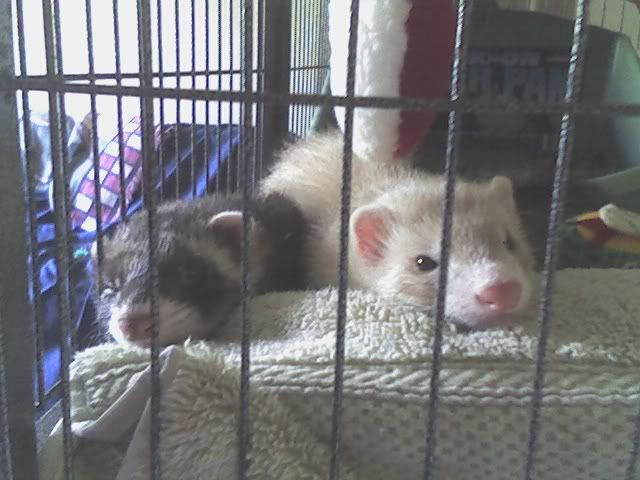Post by headismooter on May 11, 2005 23:14:39 GMT -5
i understand how a new ferret owner may not know all the in's and outs it disturbs me at times when a conversation comes about where a ferret owner says that by testing for ADV is a waste of money and is only really necessary for those nervous owners and that it is 'embellished' by many ferret owners. *sigh* i figure just to clear a few things up i would post a medical information session on ADV, testing methods and why its a good idea to test.
what is ADV?
ADV is a parvovirus that replicates within the cells to gradually infect most cells of the body. it causes a hyper autoimmune responce in the cells in the manner that it replicates continuous antibodies which over time form a plaque like deposit on the walls of organs and the vascular sites of blood vessels causing weaking of the structure and possible leakage of fluids.
How is it spread?
At the current time the only deffinate ways of transmission are through bodily fluids( saliva, urine, feces or blood) although there is speculation as to it being spread via aerosol (through the air.)
What are the symptoms?
There are two variations as to how an infected ferret may present itself. A ferret could be asymptomatic and appear as a normal healthy ferret and remain a carrier of the virus and essentially live a normal 'ferret' life without any abnormal concerns. It is believed that for some reason (perhaps a genetic mutation) some ferrets have an immunity to the virus already instilled and will never contract the disease.
The other variation is much more severe. Described as a 'wasting disease' a ferret displaying symptoms will be lethargic, anorxic, generalized weakness of pareisis of the hind end, melena and upon xray or palpation will have an enlarged spleen and liver. Typically a ferret with ADV will have chronic symptoms throughout their life although may not always shed the virus. upon plasma analysis a hypergammaglobulinemia (in lamens terms increase protein in the blood) will be seen.
The problem with these signs is that they can be easily confused with numerous other diseases.
When is the virus shed?
The virus is not shed when the virus is located within the organs of the body therefore it is not continuously shed.
Tests available:
there are a variety of tests available that vary on dependability. I personally prefer the ELISA or the CIEP tests which test for the specific protein that is present when the virus is in the body. There is a saliva test available from Avecon which has been fairly effective as well.
CIEP has one main advantage over ELISA in that it tests for several of the proteins present in ferrets with ADV and will give a positive result if any of the proteins are present. The ELISA test only tests for one protein so that if the virus is dormant it can yield a false negative.
Snap tests are available but they are limited in their uses and often if a positive is found using this method-further tests are performed to properly diagnose it.
What can you do?
unfortuantely there are no vaccines and if your ferret is ADV positive and is at a chronic state-the only treatment is supportive in nature (i.e. a high quality diet, caloric supplements such as ferretvite/ducksoup) and have to be completely isolated from cage mates as they may be a source of infection. the best prevention is testing.
Now that I have gone on a rant I would like to say one thing. The prevelance of ADV in ferrets has receeded in the past years due to a variety of factors including-better housing conditions in ferret farms (as sad as that may seem), research, awareness and increased testing. There is still a high chance that a ferret maybe positive however because this virus has the capability to mutate into a new strain. currently there are 5 known strains of ADV which affect ferrets. This is not an 'embellished' disease in ferrets and it should be something discussed at some point amongst owners because it is out there. With that said-
enjoy your ferrets.
*this is in no way meant to be condescending. i am just urked and felt that this information would be of some use if not just a good read.*
information was collected from:
various works by Dr. Bruce Williams
the AFA
the ferret aid society of mississauga
the lovely veterinarians at Links Avian and Animal Clinic
and Ferrets, RAbbits and Rodents: clinical medicine and surgery text by Hillyer and Quesenberry
what is ADV?
ADV is a parvovirus that replicates within the cells to gradually infect most cells of the body. it causes a hyper autoimmune responce in the cells in the manner that it replicates continuous antibodies which over time form a plaque like deposit on the walls of organs and the vascular sites of blood vessels causing weaking of the structure and possible leakage of fluids.
How is it spread?
At the current time the only deffinate ways of transmission are through bodily fluids( saliva, urine, feces or blood) although there is speculation as to it being spread via aerosol (through the air.)
What are the symptoms?
There are two variations as to how an infected ferret may present itself. A ferret could be asymptomatic and appear as a normal healthy ferret and remain a carrier of the virus and essentially live a normal 'ferret' life without any abnormal concerns. It is believed that for some reason (perhaps a genetic mutation) some ferrets have an immunity to the virus already instilled and will never contract the disease.
The other variation is much more severe. Described as a 'wasting disease' a ferret displaying symptoms will be lethargic, anorxic, generalized weakness of pareisis of the hind end, melena and upon xray or palpation will have an enlarged spleen and liver. Typically a ferret with ADV will have chronic symptoms throughout their life although may not always shed the virus. upon plasma analysis a hypergammaglobulinemia (in lamens terms increase protein in the blood) will be seen.
The problem with these signs is that they can be easily confused with numerous other diseases.
When is the virus shed?
The virus is not shed when the virus is located within the organs of the body therefore it is not continuously shed.
Tests available:
there are a variety of tests available that vary on dependability. I personally prefer the ELISA or the CIEP tests which test for the specific protein that is present when the virus is in the body. There is a saliva test available from Avecon which has been fairly effective as well.
CIEP has one main advantage over ELISA in that it tests for several of the proteins present in ferrets with ADV and will give a positive result if any of the proteins are present. The ELISA test only tests for one protein so that if the virus is dormant it can yield a false negative.
Snap tests are available but they are limited in their uses and often if a positive is found using this method-further tests are performed to properly diagnose it.
What can you do?
unfortuantely there are no vaccines and if your ferret is ADV positive and is at a chronic state-the only treatment is supportive in nature (i.e. a high quality diet, caloric supplements such as ferretvite/ducksoup) and have to be completely isolated from cage mates as they may be a source of infection. the best prevention is testing.
Now that I have gone on a rant I would like to say one thing. The prevelance of ADV in ferrets has receeded in the past years due to a variety of factors including-better housing conditions in ferret farms (as sad as that may seem), research, awareness and increased testing. There is still a high chance that a ferret maybe positive however because this virus has the capability to mutate into a new strain. currently there are 5 known strains of ADV which affect ferrets. This is not an 'embellished' disease in ferrets and it should be something discussed at some point amongst owners because it is out there. With that said-
enjoy your ferrets.
*this is in no way meant to be condescending. i am just urked and felt that this information would be of some use if not just a good read.*
information was collected from:
various works by Dr. Bruce Williams
the AFA
the ferret aid society of mississauga
the lovely veterinarians at Links Avian and Animal Clinic
and Ferrets, RAbbits and Rodents: clinical medicine and surgery text by Hillyer and Quesenberry





 all my kids are doing well otter is getting real beefy feeling <winter weight?> and his coat is getting real soft not many noticeable changes overall,, new guy is getting big
all my kids are doing well otter is getting real beefy feeling <winter weight?> and his coat is getting real soft not many noticeable changes overall,, new guy is getting big Daxy is SO happy the weather is cooling off! He doesn't like the AC - it limits him to one room but when I let him go other places, he just flat ferrets cause it's too hote
Daxy is SO happy the weather is cooling off! He doesn't like the AC - it limits him to one room but when I let him go other places, he just flat ferrets cause it's too hote